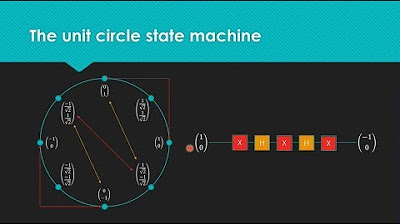Quantum Mechanics Explained in Ridiculously Simple Words
TLDRThe video script delves into the fascinating realm of quantum physics, contrasting the straightforward logic of the macroscopic world with the complex probabilities and superpositions of the microscopic one. It explains fundamental concepts such as superposition, quantum tunneling, and the photoelectric effect, which led to the development of quantum physics as a separate discipline from classical physics. The script also explores the influence of quantum physics on popular culture, particularly in science fiction, and its practical applications in emerging technologies like quantum computing and advanced communication systems.
Takeaways
- 🌀 Quantum physics deals with the fundamental particles that constitute everything in our world, including matter and energy.
- 🔄 The concept of superposition allows particles to exist in multiple states simultaneously, challenging classical binary states.
- 🎬 Popular culture, especially science fiction, has been greatly influenced by quantum physics, leading to widespread interest in the subject.
- 📈 The photoelectric effect was a key observation that classical physics could not explain, leading to the development of quantum physics.
- 💡 Max Planck's equation introduced the idea of light as quanta, which helped explain the photoelectric effect and led to the concept of photons.
- 🚀 Quantum tunneling is a phenomenon where particles can pass through energy barriers without sufficient energy, crucial for processes like nuclear fusion in stars.
- 🌟 The 'multiple realities' concept in quantum physics suggests that particles can exist in different positions across various realities, influencing theories of alternate universes.
- 🕒 Time travel in fiction often grapples with paradoxes like the Grandfather paradox, which quantum physics attempts to address through probabilities.
- 💻 Quantum computers have the potential to perform complex tasks beyond the capabilities of classical computers, impacting future technology.
- 🔐 Quantum physics is essential for secure communication systems, promising advancements in safety and privacy.
- 🌠 Understanding the quantum world is vital for exploring the universe's mysteries, as it involves the most basic building blocks of existence.
Q & A
What is the fundamental concept of superposition in quantum physics?
-Superposition is a quantum phenomenon where a particle exists in multiple states simultaneously, rather than being in a single defined state. For example, a particle can be both dead and alive at the same time, as famously illustrated by Schrödinger's cat thought experiment.
How does quantum physics differ from classical physics?
-Classical physics, which includes Newton's laws of motion, deals with the macroscopic world and everyday phenomena, while quantum physics explores the behavior of particles at the microscopic level, such as electrons, protons, and photons. Quantum physics introduces concepts like superposition and quantum tunneling that are not explained by classical physics.
What is the photoelectric effect and why was it significant in the development of quantum physics?
-The photoelectric effect is the emission of electrons from a material when it is exposed to light of a certain frequency. It was significant because it demonstrated that light has particle-like properties, carrying energy in discrete packets called quanta, which contradicted the purely wave model of light and led to the development of quantum theory.
What is quantum tunneling and how does it relate to energy production in stars?
-Quantum tunneling is a phenomenon where a particle can pass through a barrier that it classically shouldn't be able to due to a lack of energy. This process is crucial for nuclear fusion in stars, as it allows protons to overcome the energy barrier and fuse together, releasing energy in the process.
How does quantum physics contribute to the concept of multiple realities?
-Quantum physics deals with probabilities, suggesting that particles can exist in multiple states or positions simultaneously. This concept can be extended to the idea that there are many realities, each corresponding to a different possible state of a particle, leading to the notion of multiple or parallel universes.
What is the Grandfather paradox and how is it addressed in the context of time travel?
-The Grandfather paradox is a theoretical problem in time travel where a person could potentially prevent their own existence by changing past events. David Deutsch proposed a solution by suggesting that changing the past only has a certain probability of happening, thus avoiding the paradox and allowing for a more nuanced understanding of time travel in quantum terms.
How has quantum physics influenced popular culture, particularly in movies?
-Quantum physics has inspired many science fiction narratives, especially those involving alternate realities and time travel. Movies like those in the Marvel universe and 'Avengers: Endgame' use concepts from quantum physics to create dramatic and visually compelling stories, even if the scientific accuracy varies.
What are some practical applications of quantum physics in modern technology?
-Quantum physics underpins the development of quantum computers, which can perform complex tasks beyond the capabilities of classical computers. It also plays a role in advancing communication systems for enhanced safety and privacy, and is essential for understanding nuclear energy production through nuclear fission.
Why is understanding quantum physics considered important for astrophysics?
-Astrophysics seeks to understand the universe, and quantum physics provides insights into the fundamental building blocks of all matter and energy. By studying quantum physics, scientists can better comprehend the behaviors of celestial bodies and the origins of the universe.
What is the significance of the term 'quantum' in the context of physics?
-The term 'quantum' comes from Latin and means 'how much'. In physics, it refers to the smallest discrete amount of a physical entity, such as energy or charge, that can exist. This concept is central to quantum physics, which deals with the behavior of particles at the most basic levels.
How has quantum physics expanded our understanding of the world beyond the microscopic scale?
-Quantum physics has not only deepened our understanding of the microscopic world but has also influenced other scientific domains. Its principles are applied in technologies like quantum computing and have implications for fields such as cryptography and energy production, making it increasingly relevant to our daily lives and technological advancements.
Outlines
🌀 Quantum Superposition and the Birth of Quantum Physics
This paragraph introduces the concept of quantum superposition, where particles exist in multiple states simultaneously, as exemplified by Schrödinger's cat thought experiment. It contrasts this with the straightforward logic of macroscopic objects and explains that quantum physics deals with the fundamental particles that make up our world. The paragraph also discusses the limitations of classical physics and the emergence of quantum physics in the 20th century due to the inability to explain the photoelectric effect using classical theories. Einstein's contribution to the field is highlighted, proposing that light has particle-like properties, now known as photons.
🌌 Quantum Physics in Popular Culture and Its Real-World Applications
The second paragraph delves into the influence of quantum physics on popular culture, particularly in science fiction, and how it has shaped our understanding of concepts like multiple realities and time travel. It explains the theoretical basis for the 'multiple realities' concept in quantum physics, where particles can exist in different positions across various realities. The paragraph also touches on the application of quantum physics in developing technologies such as quantum computers and improving communication systems. It mentions the role of quantum physics in astrophysics and energy production, emphasizing its growing importance and potential to become an integral part of our lives.
Mindmap
Keywords
💡Superposition
💡Quantum Physics
💡Quantum Tunneling
💡Classical Physics
💡Photoelectric Effect
💡Quanta
💡Multiple Realities
💡Probability
💡Grandfather Paradox
💡Quantum Computers
💡Astrophysics
Highlights
Quantum physics deals with the fundamental particles that constitute everything in our world, including matter and energy.
Quantum physics is distinct from classical physics, which governs the macroscopic world and everyday phenomena.
The photoelectric effect was a key observation that led to the development of quantum physics.
Albert Einstein and Max Planck's work on the photoelectric effect and quanta laid the foundation for quantum theory.
Quantum superposition allows particles to exist in multiple states simultaneously, challenging our macroscopic understanding of reality.
Quantum tunneling is a phenomenon where particles can pass through energy barriers without sufficient energy.
Quantum physics has applications in popular culture, often dramatized in movies and TV shows.
The concept of multiple realities in quantum physics is used in fiction, such as Doctor Strange's portrayal of alternate universes.
The movie 'Endgame' incorporates quantum physics concepts, including the idea of time travel and the Grandfather paradox.
Quantum computers are being developed to perform tasks beyond the capabilities of classical computers.
Quantum physics plays a crucial role in the development of advanced communication systems for enhanced safety and privacy.
Nuclear fission, which enables energy production via nuclear reactors, was made possible through the study of quantum physics.
Quantum physics is integral to astrophysics, helping us understand the universe's most basic building blocks.
Quantum physics has become a necessary area of knowledge, expanding into other scientific domains and growing in importance.
The concept of probabilities in quantum physics challenges our macroscopic understanding of deterministic outcomes.
The quantum world is counterintuitive and difficult for our macroscopic brains to initially comprehend.
The application of quantum physics in various fields indicates its practical significance beyond theoretical interest.
Transcripts
Browse More Related Video

What can Schrödinger's cat teach us about quantum mechanics? - Josh Samani

Neil deGrasse Tyson Explores Quantum Entanglement with Janna Levin

Quantum Computing for Computer Scientists

The Map of Quantum Physics

Lecture 2 | Quantum Entanglements, Part 1 (Stanford)

If You Don't Understand Quantum Physics, Try This!
5.0 / 5 (0 votes)
Thanks for rating: